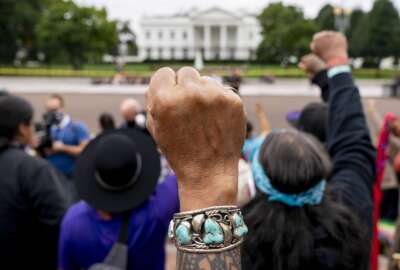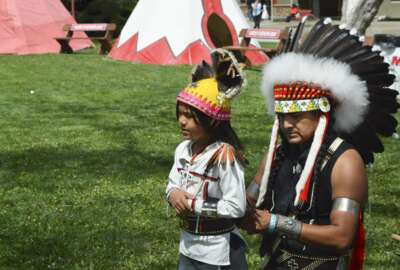
This tribal leader wants sovereignty restored that she says the government erased 50 years ago
Among the longtime Native American tribes, consider the Muwekma Ohlone tribe. It once occupied land in what is now in California's Santa Clara and San Francisco...
Among the longtime Native American tribes, consider the Muwekma Ohlone tribe. It once occupied land in what is now in California’s Santa Clara and San Francisco counties. The Bureau of Indian Affairs recognizes nearly 600 indigenous tribes, but not the Muwekma Ohlone. To see if that might soon change, the Federal Drive with Tom Temin spoke with Charlene Nijmeh, Chairwoman of the Muwekma Ohlone tribe.
Interview transcript:
Tom Temin Tell us more about this tribe. It still exists. Where do people tend to live now? And what’s the status of it?
Charlene Nijmeh My tribe is from the San Francisco Bay Area, the state of California. But we are right in the heartland of Silicon Valley, one of the wealthiest place in the nation. So our tribe was the tribe from the San Francisco Bay area. There was many villages throughout the Bay Area, but when the Spanish came, they created and established the mission system. They started in Mexico and they moved their way up north. So when they landed in San Francisco, they created Mission Dolores, Mission San Francisco, Mission Santa Clara and Mission San Jose on the East Bay side of the bay. And so my people were pushed into all three Bay Area missions. After the mission contact, then it was the Mexican period. So we went through three different governments. So pretty much my people were decimated. So the people that were left were a small community on the East Bay. And we ended up on the East Bay, because that was a place of refuge for us because of the Rancho period. We were their labor force, so we maintained their cattle and they protected us right from the settlers that were coming in because of the gold rush. And Peter Burnette, his policy of extermination on the Indians, he was one of the biggest racists senators in our history in the state of California. So we had bounties on our heads, $5 a head, bounties. So we were being hunted. And really, our landowners that we worked for protected us. We were on Phoebe Hearst land. Our community was on the Aliso Ranch ria, we were right next to her railroad station called the Verona Railroad Station.
Tom Temin What of it exists today? How many members are there and where do they generally live?
Charlene Nijmeh So we are 614 and growing, and we are spread out throughout the Bay Area. Most majority of us are on the East Bay, but we are spread out throughout the San Francisco Bay area.
Tom Temin And by the way, do any members work in the Silicon Valley, so-called industries there?
Charlene Nijmeh Yeah, we have some tech people. We are deeply embedded in the community.
Tom Temin You were once recognized by the federal government, as an indigenous tribe, and that recognition disappeared. Tell us what happened then.
Charlene Nijmeh Right. So we were acknowledged in the early century, in 1906, through Congress. They mandated to buy land for the homeless Indians in California. And our group was identified in 1906 through an Indian census to buy land for, along with the other 134 other tribes. We were identified again in 1906 to move forward for buying land. 1914 1923. But in 1927, Indian agent by the name of Lafayette Dorrington decided not to buy land for our tribe. But that didn’t mean he didn’t want to buy land because we stopped being a community, he was racist and he didn’t want to buy land for any more Indians, moving forward. Whatever was in the general fund, he wanted to take care of the Indians they already bought land for. So he removed us, Verona Bound was the first to be removed from that list of tribes to receive land. But what happened after that is the government stopped ignoring us, even though our leaders were reaching out to the [Bureau of Indian Affiars (BIA)]. What happened to our land deal around here? These were letters being sent. But what they were saying, is that’s an individual asking for themselves and their own family. Well, how do you explain when she’s saying people around here are asking? It doesn’t sound like she’s asking for herself. Moving forward, they just continue to ignore us and they didn’t add us to that 1978 list of federally recognized tribes.
Tom Temin We’re speaking with Charlene Nijmeh. She is chairwoman of the Muwekma Ohlone Native American Tribe. And you’re in Washington, you’ve been making the rounds. Do you have some reason to hope that perhaps Bureau of Indian Affairs can restore that recognition now? And what would that require? Does it take an act of Congress?
Charlene Nijmeh It’s two paths for us. It can be an act of Congress. But it’s unfortunate that we have our own delegation in the Bay Area asking us to see some of our sovereign rights. And it’s coming down to they don’t want us to do gaming in the Bay Area. And really, they should be asking about our legitimacy as a tribe, whether we’re a tribe or not. Discussing sovereignty, because those are two different issues. Sovereignty and economic development. We shouldn’t bring economic development to a sovereignty issue here.
Tom Temin Got it. So you’re not seeking a piece of land like a reservation at this point. But simply recognition.
Charlene Nijmeh Acknowledgement that we exist.
Tom Temin And what would that do for you?
Charlene Nijmeh It would give us the ability to govern ourselves on our own lands. We would have to purchase our land and put that into trust for housing. It gives us health care, education for our students. And most recently, there’s a lot of things happening now. The UC system just established free tuition for native students who are in federally recognized tribes. So that would be a benefit to our people and our youth, to move through colleges and be successful and help our nation build to be able to stay on our homelands and survive our 10,000 year history.
Tom Temin And you are in one of the most expensive real estate areas on earth. Do you have a piece of land that you could reasonably expect to acquire and establish schools and housing?
Charlene Nijmeh We, right now I’m focused on recognition. And yes, I am looking at lands to, maybe one day, own to build that native village for my people, because my children, the children of the nation are being gentrified out of the area. So, yes, those are top priorities, is building a native village and being able to govern ourselves on our own lands.
Tom Temin Because I was going to ask if you have members, say that have assimilated to a degree, they might still have their identity as members of the Muwekma Ohlone. But if they’re living in a house that they own and they’re working for a tech company and doing just fine, what would motivate them, do you think, to move to a different place? Or could the village that you build be something they visit, but they can remain living where they are?
Charlene Nijmeh Oh, no. They want to continue to stay on their homelands. They are proud people. And right now we are working together to revitalize our language, revitalize our dances and bring our culture back, because it was really taken from us. Everything was taken from us. But we are bringing that back and we are stronger and striving.
Tom Temin So among the members, you find that them and the children have an interest, you’ve noticed, in learning those the dances, the songs, the language, that type of thing?
Charlene Nijmeh Yes, Yes, most definitely.
Tom Temin Getting back to the congressional delegation that covers the areas where you are, sounds like you’re getting mixed signals from them.
Charlene Nijmeh Well, yes, I have to say I’m shocked. How receptive. I always say this is a nonpartisan issue. I need to work with both sides to make this happen. But I’m shocked at the good reception I’m getting from the Republicans. They understand that sovereignty and economic development are two different things. And they don’t ask me in my meetings. We’re not asking you to take something away from you, we understand you need to nation build. So I get a different reception when I’m dealing with the Republicans than the Democrats. I have to say, our Democratic Party, our delegates in our area, are not as receptive because they’re trying to take something. A piece of right for my children a way to be able to use in the future.
Tom Temin And what about the Bureau of Indian Affairs? Maybe they could just add you to the list. Are you sure they need congressional support to do that?
Charlene Nijmeh They can. It’s as simple as writing a letter and really correcting their mistakes.
Tom Temin What have they told you since you’ve been in town?
Charlene Nijmeh Well, they’ve said, actually, I’m barely getting a meeting with them, with the BIA. And that’s promising. But I have to say, they have shut the door on us as well, saying that you’ve been through the process and you were denied. And we made our decision and that’s final. But it’s not final, because they have to have a mechanism to correct their mistakes, and they have done that. So precedent has been set with three other tribes in California, in the same situation as Muwekma.
Tom Temin And there’s always the National Defense Authorization Act, if you could get that provision in there, that’s one way. Have you have you thought of that route?
Charlene Nijmeh No, I haven’t. Not yet.
Tom Temin Well, it’s not exactly a defense issue, but if you can get it in there, they would have to vote up on it when they pass that bill.
Charlene Nijmeh Right. I have to get everybody support first.
Copyright © 2024 Federal News Network. All rights reserved. This website is not intended for users located within the European Economic Area.
Tom Temin is host of the Federal Drive and has been providing insight on federal technology and management issues for more than 30 years.
Follow @tteminWFED
Related Stories





